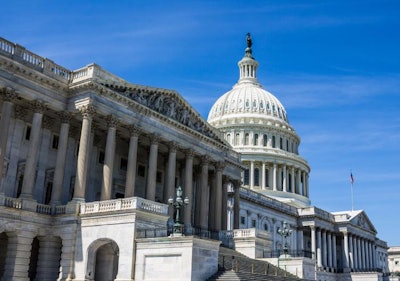
U.S. Senate Agriculture Committee Chairman Pat Roberts, R-Kansas, and Ranking Member Debbie Stabenow, D-Michigan, have released the Agriculture Improvement Act of 2018. The committee will meet to consider the legislation on June 13.
“When Ranking Member Stabenow and I started this journey in Manhattan, Kansas, last year, we made a commitment to make tough choices and produce a good, bipartisan farm bill,” said Roberts. "I’m pleased that today marks a big step in the process to get a farm bill reauthorized on time.”
“Whether it’s low prices, over burdensome regulations, or unpredictable trade markets, it’s no secret that farmers and ranchers are struggling. That’s why we need a farm bill that works for all producers across all regions. Simply put, our producers need predictability – and that’s just what our bill provides.”
“From day one, Chairman Roberts and I agreed we would craft a bipartisan bill that works for farmers, families, and rural communities,” said Stabenow. “The 2018 bipartisan Senate farm bill goes above and beyond to provide certainty for rural America and our diverse agricultural economy in Michigan and throughout the country."
“From revitalizing small towns, to promoting good stewardship of our land and water, to expanding local food economies, this farm bill is a major bipartisan victory.”
According to a press release issued jointly by Roberts and Stabenow, the Agriculture Improvement Act of 2018 provides certainty and predictability for producers across all regions, as well as those in need of assistance, by:
Providing certainty for farmers, ranchers, and growers
- Preserving and strengthening crop insurance and other risk management tools for commodity, dairy, livestock, and other producers
- Providing flexibility for producers during times of natural disasters
- Continuing and strengthening export and trade-related programs
- Supporting agriculture research and encouraging research partnerships that make farmers more productive and profitable
Strengthening integrity and food access for families
- Strengthening the integrity of the Supplemental Nutrition Assistance Program (SNAP)
- Building on successful public-private partnerships and job training to improve SNAP participants’ path to sustainable employment
- Protecting food assistance for families and expanding access to healthy foods
- Reducing burdensome paperwork for seniors in need of assistance
Strengthening voluntary conservation and forest management
- Investing in voluntary conservation on working lands and expanding regional partnerships that leverage private funds to address natural resource concerns and improve water quality
- Providing forest management reforms to federal land managers and protecting against wildfires
- Securing opportunities for outdoor recreation by adding 1 million new acres to the Conservation Reserve Program and strengthening voluntary public access
Investing in rural America
- Connecting rural America by expanding high-speed internet
- Fighting the opioid epidemic with prevention and treatment efforts
- Investing in water infrastructure for rural communities
- Preserving renewable energy investments that lower utility bills and support energy installation jobs
Growing the diversity of the American agricultural economy
- Supporting farmer veterans and new farmers beginning careers in agriculture
- Strengthening local food economies that enable farmers to sell their products to their neighbors
- Growing emerging opportunities in organic production and urban agriculture
- Bolstering biodefense preparedness efforts to protect United States agriculture and food.
House bill yet to be passed
While the Senate is starting the process of advancing a farm bill, efforts to do so in the House have failed.
The House version of the farm bill failed in May by a 198-213 vote.
Representatives of both parties expressed regret of the partisan nature of the farm bill talks, but have also expressed optimism that a compromise can be reached.
The deadline to pass a farm bill is September 30.














